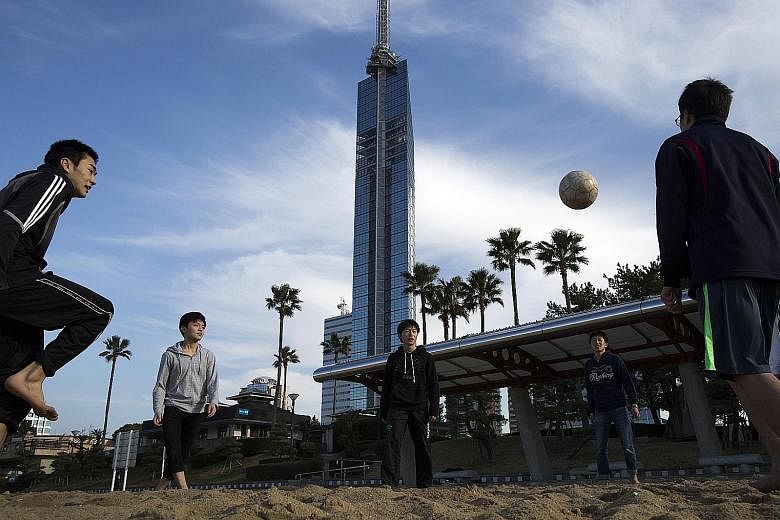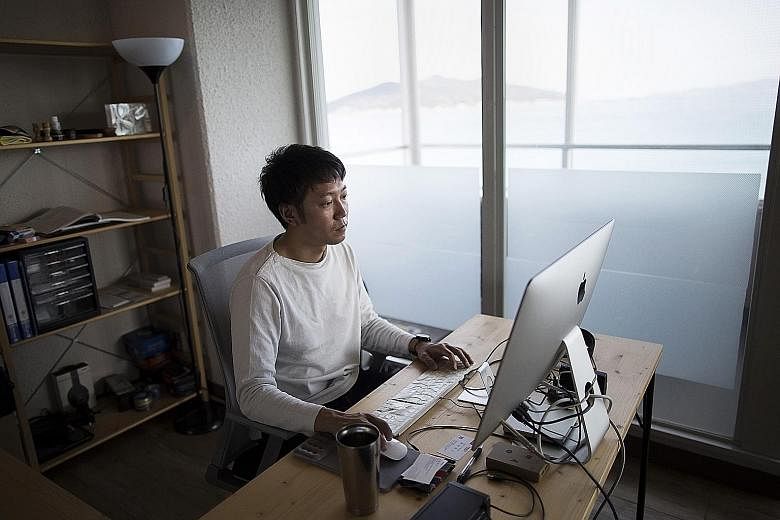TOKYO • From the fifth-floor office of his Internet start-up, Mr Kazz Watabe can see the sea bass jump in the bay as he works on his fishing website to the sound of jazz and the waves washing on the beach below.
It is a scene that could be from any of the seaside start-up hubs developing worldwide - Seattle, Tel Aviv, Barcelona, Sydney - but Mr Watabe's Umeebe Inc is in ageing Japan, far from Tokyo, in the western port of Fukuoka.
"It's not a bad idea to build your business after thinking first about what kind of environment you want to be in," said the 30-year-old, who moved to the city in late 2013 from the capital Tokyo to develop smartphone apps and software that helps anglers find fish and share pictures of their catch.
Fukuoka is Japan's fastest-growing major city, outside of Tokyo, which has been steadily draining talent and workers from the rest of the country for decades. This ancient port, hemmed in by mountains and as close to Shanghai as it is to Tokyo, is bucking that trend, drawing entrepreneurs like Mr Watabe from Japan and abroad.
Mr Soichiro Takashima, elected the youngest mayor in the city's history in 2010, is leveraging its status as a national strategic special zone, cutting red tape and introducing incentives like Japan's first "Start-up Visa", which gives entrepreneurs a six-month exemption from the investment and hiring requirements of a business visa.
"We want to give it a try before anyone else," said Mr Takashima, 42. "Others will come and see how we do it. That's the fastest way to change Japan."
Key to Fukuoka's aim to become an Asian gateway is its location. At the airport, in the heart of the city, planes queue up to fly to places like Hong Kong, Singapore and Taiwan. Over 800 million people live within a three-hour flight of the city.
The city's 7.2 trillion yen (S$90 billion) economy is about 7 per cent of the size of Tokyo's and average office rents are 50 per cent cheaper. While Tokyo sits in the middle of a conurbation of more than 35 million people, Fukuoka's residents are a short drive from the beach or the mountains.
"It's pretty hard to beat this location," said Mr Noritaka Ochiai, CEO of the Fukuoka unit of Line Corp, the South Korean-owned company that runs Japan's top smartphone messaging app, in his office next to the city's main railway station, which is a 10-minute subway ride from the airport.
Line Fukuoka has added over 600 jobs since opening in late 2013. About half its engineers are foreigners. "We welcome anyone who has skills, fits our culture and is interested in us," said Mr Ochiai, 42.
Encouraging risk has made Fukuoka a make-or-break city. It has the highest ratio of new business starts among Japan's 21 biggest cities and the second-highest rate of ventures closing, the Fukuoka Asian Urban Research Centre says. Nine out of 10 jobs are in services, against 71 per cent nationwide.
Boston-based financial services firm State Street Corp opened an operational centre with about 130 people from some 20 countries in Fukuoka after the 2011 tsunami and nuclear disaster in eastern Japan.
"Keeping us only in Tokyo came with a number of risks," said Mr Richard Fogarty, head of State Street Global Services in Japan. He said the biggest factor in choosing Fukuoka was the large pool of college graduates.
Ringed by mountains and 200km across the Korea Strait from South Korea's Busan port, Fukuoka's development has been forged as much by geography as planning.
The bowl of hills created a compact, commercial hub at the mouth of the snaking Naka River, with a broad lagoon that hosts one of Japan's largest passenger ports.
Fukuoka, whose samurai warriors held off Kublai Khan's invading Mongol army in the 13th century, has been picked as a national strategic special zone for jobs and business creation.
"When young people do something, they have to start with niche, small things," said Mr Kozo Yamamoto, 68, minister of regulatory reforms and regional revitalisation. "Fukuoka is outperforming in that sense."
BLOOMBERG


